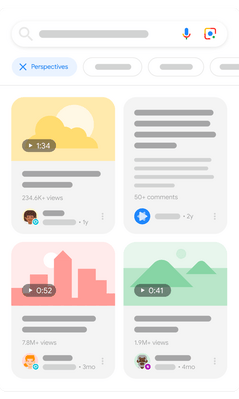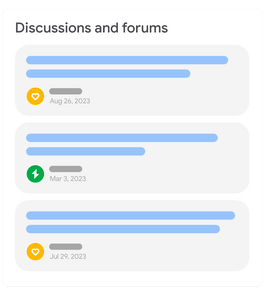American Thanksgiving weekend just came to an end, and Google, thankfully, gave us two new rich results to close out the weekend.
On November 27, 2023, Google released the new Profile Page structured data and Discussion Forum structured data. This comes after they announced the new Course Info structured data on November 15 and Vehicle Listing structured data on October 16. This holds to what John Mueller mentioned in the October 2023 Google Search News Update that some rich results would go away, and new ones would be introduced. Never before have four new rich results been announced in such a short time period.
Despite deprecating How-To structured data and reducing the frequency of FAQ rich results being shown, these 4 new rich results reflect a new investment in structured data from Google. And the reason for their investment in structured data is simple.
Structured data, also known as Schema Markup, helps search engines and machines (AI) understand and contextualize the content on your site to provide users with more relevant search results. As Google and Bing invest in generative AI search experiences driven by Large Language Models (LLMs), the Schema Markup on your site helps them reduce errors and delight their customers. Read more about the evolving role of Schema Markup and Knowledge Graphs.
Let’s dive deeper into these two new rich results to see how you can maximize them to stand out in search.
Profile page (ProfilePage) structured data
ProfilePage structured data is great for websites that have creators (person or organization) who share first-hand perspectives. It can be used to describe author profile pages on a news site, employee pages on a company website, and user profile pages on a forum or social media site. Google can use this information in features such as Perspectives and Discussions and Forums.
It can also be nested in other structured data features that have authors such as Article, Recipe, Discussion Forum and Q&A page.
By adding ProfilePage markup and the required/recommended properties to your page, Google can highlight the creator’s information, such as their name, follower count, content popularity, social media handles, and more, on the Search Engine Results Page (SERP).
But more importantly, Google can leverage this markup to disambiguate the creator. Even though search engines like Google use natural language processing models like BERT to gain a better understanding of your content, these models are still prone to errors.
When you use structured data to identify the creator as an entity and connect them to the articles or posts they’ve written, you are building your knowledge graph. Your knowledge graph showcases the relationships between the things on your site and helps search engines understand and contextualize who wrote your content with greater accuracy.
When search engines have an in-depth understanding of the person or organization that wrote the content on your site, it can also boost your E-E-A-T. Information such as follower count and the number of posts written are signals of experience, expertise, authority and trust.
On top of yielding rich results for your organization, adding ProfilePage markup to your site can also help improve the semantic understanding of your site.
The enhancement report and performance report for ProfilePage structured data is now available in Google Search Console.
Discussion forum (DiscussionForumPosting) structured data
Discussion forum structured data can be used to describe user-generated content on forum-style websites such as gaming forums. However, it shouldn’t be used for content primarily authored by the website publisher or their agents (i.e. article or blog posts with comments, product reviews provided by the users).
Forum sites that add this Schema Markup can help Google better identify the online discussions happening across the web and highlight them on features such as Perspectives and Discussions and Forums.
Discussion Forum Schema Markup is very similar to the existing Q&A Schema Markup. However, Discussion Forum markup should be used on pages where the responses to the thread are comments. For example, the threads on the subreddit ‘r/mildlyinteresting’ would be appropriate for Discussion Forum markup because the user is making a statement and expecting other users to comment on the thread.
Conversely, you should only use Q&A markup when the page has questions and answers. For example, the threads on Quora would be appropriate for QAPage markup because the user is posing a question on the page and expecting answers to be provided in the comments.
Unlike other structured data features, Google recommends web publishers provide the DiscussionForumPosting markup in Microdata or RDFa, instead of JSON-LD. This prevents publishers from having to duplicate large blocks of text within the markup. However, using JSON-LD will not impact your eligibility for this rich result.
The enhancement report and performance report for Discussion forum markup is also available on Google Search Console.
Read Google’s document for more information on how to use DiscussionForumPosting markup.
Conclusion
Based on the rich result changes we’ve seen this year, one thing’s for sure. Google can add new rich results as fast as they can take them away from us.
To thrive in this ever-changing environment, organizations need to be agile and ready to implement new or update their existing semantic Schema Markup markup to stay relevant and leading in search.
If you want to increase your visibility and relevance on search, we can help! Contact us to learn more about our scalable semantic Schema Markup solution.



